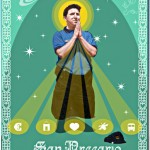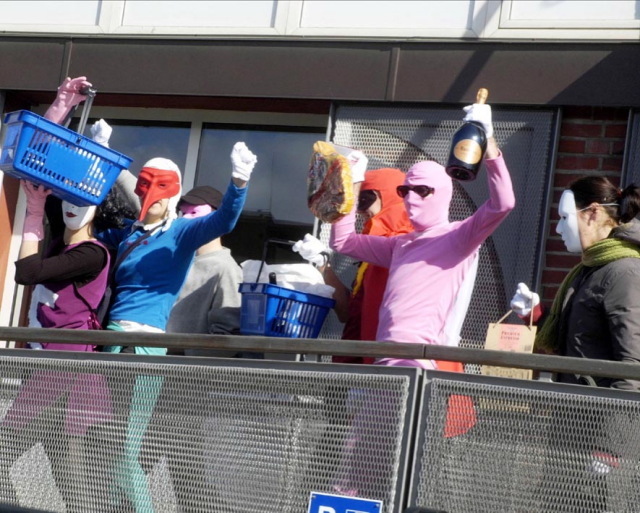On the 28th of April 2006 a group of activists dressed in Superhero costumes burst into the insanely expensive Hamburg delicatessen, Frische Paradies and ran out with 1500 Euros worth of expensive food. Despite several police cars and a helicopter rushing to the scene, the culprits they got clean away. Not, however, before they posed for the photo above, which they release along with a communiqué explaining that the food was given away to some of the city’s precarious workers. Months later the police raid some houses and arrest a woman in relation to the incident. The evidence against her wasn’t the strongest; they claimed that she sometimes wore her hair in a ponytail, as did one of the superheroes, and that on her computer were documents that mentioned precarity, which was also mentioned in the Superheroes communiqué. The case against her has recently been dismissed.
It’s a nice story but I want to use the incident to think through some recent concerns. Firstly, responses to the current crises. Secondly how to act without that acting seeming like specialised work for activists. And thirdly, how mediatised figures can change the way people think about themselves by allowing them to recognize commonalities with others.
In many ways the incident chimes with other recent actions and suggestions, which are all variations on the tradition of self-reduction struggles. In the UK there has been a suggestion for a Price Reduction Campaign, we’ve mentioned this before. The idea is to organize mass meetings outside supermarkets to decide what a fair price for essential goods should be in these exceptional times. One of the problems with this idea is how to avoid getting trapped in the identity of ‘consumers’ or ‘customers’. Another recent practice has been that of the Greek Robin Hoods, who have conducted mass raids on supermarkets, leaving the goods outside for the general public to help themselves. A problem with this, however, is that it is acting on behalf of other people, which could reinforce the identity of the activist as separate from passive category, ‘ordinary people’.
The precarious superheroes incident might seem similar but they try to overcome such problems by inventing identities meant to represent common experiences of precariousness. The superheroes call themselves names like Spidermom, Multiflex, Santa Guevara and Operaistorix. The idea is that you need super human abilities just to survive in this world of insecurity and precarity. As they explain:
“Superflex is familiar with every type of job contract: part time, full time, internship. All the stress led him to a pleasant mutation of his molecules… Operaistorix survived the last few years with the help of his unemployment module… Spider Mum’s mutant body developed somewhere between the kindergarten and unpaid and paid cleaning jobs. In her hands, Ajax and a mop turn into merciless weapons… Santa Guevara dodges all control checks and disappears without a trace. With this power, he is able to escape from the boredom of call centers and university seminars.”
 We could think of the superheroes as P2P icons, a concept first raised in the context of San Precario, the patron saint of the precarious. San Precario was invented as a symbol or icon in which all the different experiences of the precarious could invest their desires. Large models of San Precario have been carried round on demonstrations, like the saints parades of Catholic countries.
We could think of the superheroes as P2P icons, a concept first raised in the context of San Precario, the patron saint of the precarious. San Precario was invented as a symbol or icon in which all the different experiences of the precarious could invest their desires. Large models of San Precario have been carried round on demonstrations, like the saints parades of Catholic countries.
The superheroes are a variation on this theme that address the problem of how people’s subjective understanding of themselves can limit their possibilities. Or as Mario Tronti put it: ‘As a matter of urgency we must get hold of, and start circulating, a photograph of the worker-proletariat that shows him as he really is – “proud and menacing”‘. The certainty and dignity of the job for life, that was some small compensation for the world of the mass workplace, has become increasingly rare. The precarious superheroes want to create a new “proud and menacing” photograph by reframing our precarious experiences as training for a world when we are in control of our lives and can be as flexible as we want. With the crumbling of the financial sector, the erstwhile ‘masters of the universe’ have been revealed as small men who wasted their lives building pointless pyramid skills. Our greatest revenge would be the menacing prospect of a new class of people stepping on to the world stage. As Spidermom says:
“We don’t care for the romanticism of the lonely hero type, we’d much rather bump into more and more superheroes in our daily lives.”


Comments Off on Precarious Superheroes